Just change the pronunciation and have the Catholic ones in the Republican Union referred to as Sacred, Santo, San, or Santa. On that note, when will Santa Claus come? He could represent the census or tax people who looks over the lists of the people who have been naughty before making people vanish 'up the chimney' on Christmas or New Year's day."Saints" in quotation marks.It's an odd unofficial system they have for "martyrs" and heroes. They probably just call them Patriots. "Patriot-Saints" will eventually be a thing, though.
You are using an out of date browser. It may not display this or other websites correctly.
You should upgrade or use an alternative browser.
You should upgrade or use an alternative browser.
"What Madness Is This?" - A Timeline
- Thread starter Napoleon53
- Start date
One of the longest chapters in the whole TL.  Every single Southron nation even has a complete list of leaders.
Every single Southron nation even has a complete list of leaders.
THE SOUTHRON NATIONS
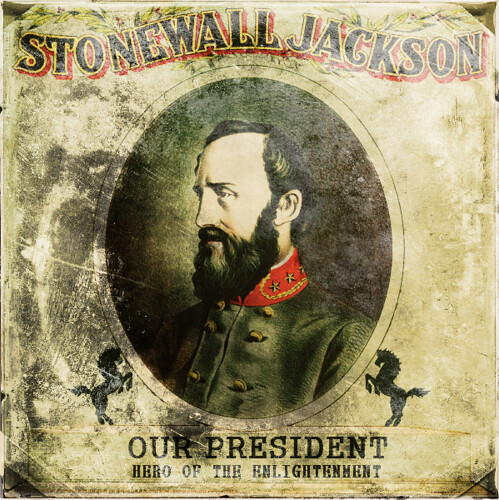
Campaign poster for Virginian President Thomas "Stonewall" Jackson
During the period between 1850 and 1900, the formerly rivaled Southron republics (Virginia, Maryland, Georgia, West Florida, and the Carolinas) formed closer friendships (though Virginia and Maryland were already allies, as were Georgia and West Florida). Part of the reason for less tension was the death of the Carolinas' antagonistic Chancellor Andrew Jackson, and also the growing diversity of economies. No longer did all the countries depend on cotton and tobacco to stay afloat, thus eliminating brutal competition over those two resources.
The Republic of Virginia, for example, excelled at manufacturing, and during just the two terms Robert Edward Lee was president (1860-1868), Newport News doubled in size, becoming the hemisphere's greatest industrial center. In the 1880s, the stoic Christian Thomas Jackson earned the name "Stonewall" for "standing like a stone wall" against slavery. He proclaimed that it was a "medieval" system and was worthless and immoral in the current times. Many immigrant workers from Europe were begging for the jobs that blacks did for free, after all.
THE REPUBLIC OF VIRGINIA:
The Republic of Virginia, for example, excelled at manufacturing, and during just the two terms Robert Edward Lee was president (1860-1868), Newport News doubled in size, becoming the hemisphere's greatest industrial center. In the 1880s, the stoic Christian Thomas Jackson earned the name "Stonewall" for "standing like a stone wall" against slavery. He proclaimed that it was a "medieval" system and was worthless and immoral in the current times. Many immigrant workers from Europe were begging for the jobs that blacks did for free, after all.
"It would be folly to continue this free labor system of slavery. It would be better for the sake of future generations to invite these immigrants in and pay them, than to continue using slave labor. These immigrants will strengthen our population and economy to compete with the meddling Yankees, while continued slavery will only make our people fat and lazy, and cause generations of racial hatred once we free the them (and rest assured, it is inevitable and our destiny to free them). I say, Gentlemen of the House, that we must free the Negro. By doing such, we will move into the Modern Industrial Era of greatness our allies in France entered when Napoleon II signed the Emancipation Proclamation."
-Burgess Thomas Jackson in the Virginian House of Burgesses, May 8th, 1882.
-Burgess Thomas Jackson in the Virginian House of Burgesses, May 8th, 1882.
Following two years of campaigning, Jackson won out, and on July 4th, 1884, the institution of slavery was declared outlawed by the House of Burgesses. Proper compensation and time for plantations to cooperate and make plans were allotted, but by another two years' passing, most every slave in the state was free. The government still did not like the idea of jobless Negros running around, and many of the former slaves traveled west, where French companies needed manual labor to continue building railroads out to California (where France had finally pushed out Mexican influence through a series of guerrilla campaigns and undeclared wars).
Next for Virginia was its goal of a nation-wide telegraph system. Newport News was the birthplace of the invention, and since 1845, the Newport News Telegraph Company had been trying to get government backing to wire the whole republic. Beginning in 1856, they set out to do just that, and government troops (including a young Stonewall Jackson) guarded them from Indian attack and brigands all the way west until they reached the Mississippi River. Trains came just a year later, and by 1860 it was said that every Virginian was within one mile of a telegraph office and within five of a train track. Eastern Virginia was described by a visiting Danish-Norwegian politician to be "more crowded than Denmark, and in Newport News one would think Copenhagen's streets look empty by comparison."
Politics in Virginia were interesting, as the unusual House of Burgesses system was very pompous, old-fashioned, and "so very Virginian." There were numerous parties, ranging from the limited government-based Jeffersonian Party, the Christian Democrat Party (Protestant, pro-military, anti-Union), and the extremely short-lived Progressive Republican Party, founded by moderate "Christian Socialists."
One last important thing to note about Virginia was the fact the national flag was changed from the simple white banner adopted by the Jeffersonians during the Fall of the Old Republic to the much prettier and more colorful "Star-and-Bars." It was one of the first changes Thomas Jackson made upon becoming president in 1888.

Second national flag of the Republic of Virginia (Star-and-Bars)
LIST OF VIRGINIAN PRESIDENTS:
THE CHESAPEAKE REPUBLIC OF MARYLAND:
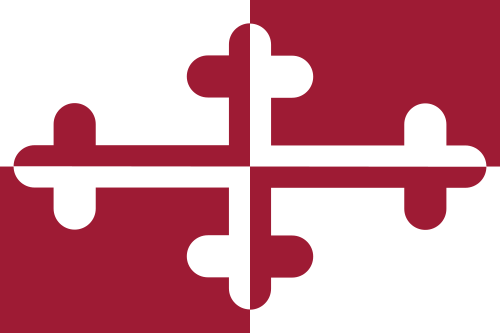
Next for Virginia was its goal of a nation-wide telegraph system. Newport News was the birthplace of the invention, and since 1845, the Newport News Telegraph Company had been trying to get government backing to wire the whole republic. Beginning in 1856, they set out to do just that, and government troops (including a young Stonewall Jackson) guarded them from Indian attack and brigands all the way west until they reached the Mississippi River. Trains came just a year later, and by 1860 it was said that every Virginian was within one mile of a telegraph office and within five of a train track. Eastern Virginia was described by a visiting Danish-Norwegian politician to be "more crowded than Denmark, and in Newport News one would think Copenhagen's streets look empty by comparison."
Politics in Virginia were interesting, as the unusual House of Burgesses system was very pompous, old-fashioned, and "so very Virginian." There were numerous parties, ranging from the limited government-based Jeffersonian Party, the Christian Democrat Party (Protestant, pro-military, anti-Union), and the extremely short-lived Progressive Republican Party, founded by moderate "Christian Socialists."
One last important thing to note about Virginia was the fact the national flag was changed from the simple white banner adopted by the Jeffersonians during the Fall of the Old Republic to the much prettier and more colorful "Star-and-Bars." It was one of the first changes Thomas Jackson made upon becoming president in 1888.
Second national flag of the Republic of Virginia (Star-and-Bars)
LIST OF VIRGINIAN PRESIDENTS:
- Thomas Jefferson (1801 - 1808*)
- James Madison (1808 - 1816)
- James Monroe (1816 - 1824)
- Henry Clay (1824 - 1832)
- Samuel Houston (1832 - 1840)
- Zachary Taylor (1848 - 1856)
- Jefferson Davis (1856 - 1860**)
- Robert Edward Lee (1860 -1868)
- Theophilus T. Garrard (1868 - 1876)
- John Pope (1884 - 1888)
- Thomas Jackson (1888 - 1892)
- Joseph E. Johnston (1892 - 1895***)
- Caleb Powers (1895 - 1896***)
- William O'Connell Bradley (1896 - 1904)
- Jeffersonian Party
- Progressive Republican Party
- Christian Democrat Party
- Independent
* Jefferson retired from office in 1808 supposedly for health reasons, but rumors said stories of his affairs with slaves were about to come out. He became a political godfather until his death in 1824.
**Davis hated being president, and refused to run for a second term
***Johnston was the oldest Virginian president ever elected, and died before finishing his term. His very young VP Caleb Powers completed the term and did not run for a second.
**Davis hated being president, and refused to run for a second term
***Johnston was the oldest Virginian president ever elected, and died before finishing his term. His very young VP Caleb Powers completed the term and did not run for a second.
THE CHESAPEAKE REPUBLIC OF MARYLAND:

Maryland was essentially an extension of Virginia, and it pretty much always had been. Being small, it was a highly-urbanized, naval-centric society. Maryland was considered by its allies as a first line of defense against any possible Republican Union attack, and as such Maryland built up a small but powerful army (the best equipped in North America) and navy and allowed allied troops to maintain positions along the Union border. Maryland worried for years about the ability of the Union navy to sail into Chesapeake Bay and blockade them, and this led to the construction of the massive Citadel of Columbia on the banks of the Potomac, a joint operation with Virginia based in Georgetown, Maryland. The Citadel served as a base for the pooled Southron forces guarding against attack from Pennsylvania and Delaware and protected the vital Chesapeake and Potomac. The every-day operations stretched all the way down to St. Mary's City.

A massive cannon at the Citadel of Columbia (1876)
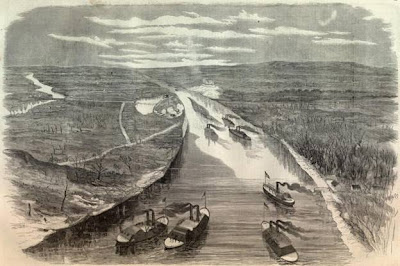
Marylander "ironclads" patrol the Potomac (1880)

A massive cannon at the Citadel of Columbia (1876)

Marylander "ironclads" patrol the Potomac (1880)
The Maryland economy depended not on agriculture, but fishing, whaling, and trading. By the 1870s, slavery had essentially died, but the Chesapeake Republic followed Virginia's example and officially outlawed it in 1885. Marylander fishing vessels were known to turn up in Asia from time to time, and they were frequently found whaling off the coast of Peru. One whaler, Thomas St. Patrick, turned his experiences into the best-selling novel Mocha Jack, about a Marylander captain named Ishmael who becomes obsessed with killing the legendary titular whale.
Maryland politics were very simple and with such a small country only two real parties existed, the Jeffersonians and the Christian Democrats, both the same as the Virginian parties. President were elected every eight years, and could run twice.
Maryland politics were very simple and with such a small country only two real parties existed, the Jeffersonians and the Christian Democrats, both the same as the Virginian parties. President were elected every eight years, and could run twice.
LIST OF MARYLAND PRESIDENTS:
- Samuel Chase (1801 - 1809)
- Oliver Williams (1809 - 1825)
- Peter House (1825 - 1833)
- James Alan Thompson (1833 - 1841)
- Thomas George Pratt (1841 - 1857)
- Francis Thomas (1857 - 1873)
- Horatio Gates Gibson (1873 - 1889)
- Elihu Emory Jackson(1889 - 1897)
- Frank Brown (1897 - 1913)
- Jeffersonian Party
- Christian Democrat Party
- Independent
THE CONFEDERATION OF THE CAROLINAS:

Out of all the Southron nations, the "CoCaro" was the most akin to a dictatorship. Andrew Jackson had ruled with a mighty fist from when the country broke away to when he died in 1850. He had been highly antagonistic and bombastic, and as mentioned before he had been called a "venomous old vulture" by Thomas Jefferson. He disarmed most of the CoCaro Constitution during the War of 1812, when he turned the Virgin Islands into his own private little ranch. The Bragg family put up a semblance of independence as hereditary "Governor-Generals" in the "Virgin Islands Confederacy," but the Jackson family decided everything. While elections in the CoCaro were fair, free, and open, virtually anyone with the name "Jackson" or with the Jackson family's backing would gain widespread popular support. It should be noted, though, that even the Chancellors with dictatorial tendencies meant well. Starting in 1860, Chancellors began recognizing an unofficial rule that they should serve single six year terms.
The economy of the CoCaro was still mainly agricultural, but its large collection of Caribbean islands meant they could grow spices, sugar, and other, more exotic and expensive trade items. Fishing was also a prominent source of income, and "Cokie" ships sailed all the way to the coasts of Europe sometimes to search for rarer fish. Chancellor Nathan Bedford Forrest finally abolished slavery in the Confederation in 1895. Forrest was a part of the moderate Labor Party, which appealed to the common man and was an evolution and break-off of the Jacksonian Party, while the Democratic Party stood for the land-owning gentry and the Jacksonian Party stood for hard-core militarism and ultra-nationalism.
The military of the CoCaro was not extremely large, but it was well-equipped and could immediately triple in size if a war came. The navy was rather lacking and outdated, mostly wooden vessels of the 1812 era, but the few ironclads they had were well-built and as powerful as any. The Carolinas' depended on being able to ship their soldiers north if a war broke out, and the nearby allied Virginian navy agreed to provide warships to fight off Union vessels should the time arise.
The economy of the CoCaro was still mainly agricultural, but its large collection of Caribbean islands meant they could grow spices, sugar, and other, more exotic and expensive trade items. Fishing was also a prominent source of income, and "Cokie" ships sailed all the way to the coasts of Europe sometimes to search for rarer fish. Chancellor Nathan Bedford Forrest finally abolished slavery in the Confederation in 1895. Forrest was a part of the moderate Labor Party, which appealed to the common man and was an evolution and break-off of the Jacksonian Party, while the Democratic Party stood for the land-owning gentry and the Jacksonian Party stood for hard-core militarism and ultra-nationalism.
The military of the CoCaro was not extremely large, but it was well-equipped and could immediately triple in size if a war came. The navy was rather lacking and outdated, mostly wooden vessels of the 1812 era, but the few ironclads they had were well-built and as powerful as any. The Carolinas' depended on being able to ship their soldiers north if a war broke out, and the nearby allied Virginian navy agreed to provide warships to fight off Union vessels should the time arise.
LIST OF CAROLINIAN CHANCELLORS:
THE REPUBLIC OF GEORGIA:

- Andrew Jackson (1801 - 1850)
- Andrew Jackson II (1850 - 1860)
- James Longstreet (1860 - 1866)
- William R. Cox (1866 - 1872)
- Andrew Johnson (1872 - 1878)
- James Johnston Pettigrew (1878 - 1884)
- Milledge Bonham (1884 - 1890)
- Nathan Bedford Forrest (1890 - 1896)
- Wade Hampton III (1896 - 1902)
- Democratic Party
- Jacksonian Party
- Labor Party
- Thomas Bragg (1812 - 1857)
- Braxton Bragg (1857 - 1889)
- Thomas Christopher Bragg (1889 - 1917)
- Jacksonian Party
THE REPUBLIC OF GEORGIA:
The Republic of Georgia was the most agriculturally-based nation in "Columbia" (a term first used to describe the Southron nations as a whole around 1840), and by 1840 was increasingly Catholic. It still had cotton and tobacco as its primary resources, but also owned islands in the Caribbean it received more exotic goods from. Georgia felt the blow from France's cotton plantations in India, and its slavery system took an even harder blow from the increasing mechanization of cotton seed-picking and harvesting. When mechanical harvesters appeared in the 1880s, it was only a matter of time before slavery was abolished. In 1890, Prime Minister John B. Gordon declared the importation of new slaves (as well as the re-selling of current ones) to be illegal. Three years later, slavery was ended.
Georgia and the Carolinas were the two Southron nations which squabbled the most. Thanks to constant feuding over the West Carolina border, several groups of surveyors from both countries almost started a war in 1848 in the so-called Battle of Chattanooga. Eight men were killed following heated disputes about who had the right to call the location their own. In the 1850s, the nations started to repair their relationship.
The Georgian military was extremely strong, and the navy was huge. Traditional warships and fleets of ironclads patrolled the waters off the Atlantic coast, the tip of Florida, the entirety of the Gulf of Mexico, and the Mississippi. Georgia was by far the most interventionist of the Southron "Columbian" nations, having deployed its men and ships unrequested in both the Texas War for Independence and several uprisings in South America. Additionally, the small West Florida Republic found itself annexed into Georgia in 1850, making Georgia the only Southron nation to expand in the century and the only expansion since the Republican Union invaded and took over the Green Mountain Republic.
Georgia and the Carolinas were the two Southron nations which squabbled the most. Thanks to constant feuding over the West Carolina border, several groups of surveyors from both countries almost started a war in 1848 in the so-called Battle of Chattanooga. Eight men were killed following heated disputes about who had the right to call the location their own. In the 1850s, the nations started to repair their relationship.
The Georgian military was extremely strong, and the navy was huge. Traditional warships and fleets of ironclads patrolled the waters off the Atlantic coast, the tip of Florida, the entirety of the Gulf of Mexico, and the Mississippi. Georgia was by far the most interventionist of the Southron "Columbian" nations, having deployed its men and ships unrequested in both the Texas War for Independence and several uprisings in South America. Additionally, the small West Florida Republic found itself annexed into Georgia in 1850, making Georgia the only Southron nation to expand in the century and the only expansion since the Republican Union invaded and took over the Green Mountain Republic.
LIST OF GEORGIAN PRIME MINISTERS:
- Archibald Bulloch (1801 - 1809)
- George Troup (1809 - 1817)
- George R. Gilmer (1817 - 1825)
- Charles James McDonald (1825 - 1833)
- George Crawford (1833 - 1841)
- George Bonaparte Towns (1841 - 1849)
- Herschel Vespasian Johnson (1849 - 1853)
- George Bonaparte Towns (1853 - 1861)
- Earl Van Dorn (1861 - 1869)
- William Barksdale (1868 - 1877)
- Carnot Posey (1877 - 1885)
- Charles Bissette (1885 - 1889)
- John Brown Gordon (1889 - 1897)
- Johnny O'Reilly (1897 - 1905)
- Liberty Party
- Patriot Party
- Log Cabin Party
- Independent
Last edited:
Wow! Some comments;
-President "Stonewall" Jackson? Thanks for that, really . IDK if my suggestion went into that decision, but either way I'm pleased
. IDK if my suggestion went into that decision, but either way I'm pleased
-Whatever happened to Virginia's seal? Was that considered separate from the "Stars and Bars", or was it replaced by said flag?
-Militarily, how strong is Virginia in "Columbia"? We know that Maryland's Navy is strong, Carolina's Army is pretty good, and Georgia is a powerhouse.
-I love how OTL's Washington still kinda exists, even though only as a super-fortress against outside aggression . Does Delmarva belong wholly to Maryland, or is it still split between MD and VA?
. Does Delmarva belong wholly to Maryland, or is it still split between MD and VA?
-Nathan Bedford FORREST was the one to free the slaves in CoCaro?! . YGBSM, is all I can really say. As an aside, I like how the Tidewater states seem to have overlapping military coverage, with Carolinian troops poised to head northward in case of trouble, and Virginia's Navy handling coastal defense.
. YGBSM, is all I can really say. As an aside, I like how the Tidewater states seem to have overlapping military coverage, with Carolinian troops poised to head northward in case of trouble, and Virginia's Navy handling coastal defense.
-Thank you for coining a catch-all name for the Southron nations. Granted, "Dixie" works well in OTL for the South in a poetic sense, but it falls short in geopolitical terms or in reference to its people. "Sit Columbia prospere et vigent" (for now, at least...)
-Georgia finally seems to be on board with dropping that "institution", even while stretching the legs of imperialism in West Florida and beyond. Here's hoping that "Chattanooga" doesn't continue to bode too ill for inter-Columbian relations (I could get used to this!)
Keep up the great work!
-President "Stonewall" Jackson? Thanks for that, really
-Whatever happened to Virginia's seal? Was that considered separate from the "Stars and Bars", or was it replaced by said flag?
-Militarily, how strong is Virginia in "Columbia"? We know that Maryland's Navy is strong, Carolina's Army is pretty good, and Georgia is a powerhouse.
-I love how OTL's Washington still kinda exists, even though only as a super-fortress against outside aggression
-Nathan Bedford FORREST was the one to free the slaves in CoCaro?!
-Thank you for coining a catch-all name for the Southron nations. Granted, "Dixie" works well in OTL for the South in a poetic sense, but it falls short in geopolitical terms or in reference to its people. "Sit Columbia prospere et vigent" (for now, at least...)
-Georgia finally seems to be on board with dropping that "institution", even while stretching the legs of imperialism in West Florida and beyond. Here's hoping that "Chattanooga" doesn't continue to bode too ill for inter-Columbian relations (I could get used to this!)
Keep up the great work!
All questions answered!
Your idea did indeed inspire President Jackson.
Yep, Virginia still has its seal.
Darn, I forgot to say how powerful VA's army is? I'll edit it in.
Delmarva is still split.
Thanks a lot!
-President "Stonewall" Jackson? Thanks for that, really. IDK if my suggestion went into that decision, but either way I'm pleased
-Whatever happened to Virginia's seal? Was that considered separate from the "Stars and Bars", or was it replaced by said flag?
-Militarily, how strong is Virginia in "Columbia"? We know that Maryland's Navy is strong, Carolina's Army is pretty good, and Georgia is a powerhouse.
-I love how OTL's Washington still kinda exists, even though only as a super-fortress against outside aggression. Does Delmarva belong wholly to Maryland, or is it still split between MD and VA?
Keep up the great work!
Your idea did indeed inspire President Jackson.
Yep, Virginia still has its seal.
Darn, I forgot to say how powerful VA's army is? I'll edit it in.
Delmarva is still split.
Thanks a lot!
Hi Napoleon53 , excellent story as always .
Will we see Jackson vs Custer in battle ? It would be simply awesome.
It has been a long time since there was a major conflict . Will the Republican Union try to subdue their neighbours in the next one ?
Thanks!
Even though I agree with you, Custer will not be fighting Jackson. If you had posted it a few chapters ago, I might have done it though.
I will give a hint here at the next chapters: a major conflict in Asia is coming in 1901 with the colonial powers in competition to grab as much land as possible. You will see the Republican Union Bluecoats invading Korea and taking Pacific Islands, among many other things. It'll be the first test of Custer's army (he'll become leader in the next chapter). Also, Africa is about to be divided up, Arabia shall be unified, and there will be more territorial exchanges than you can shake a stick at.
EDIT:
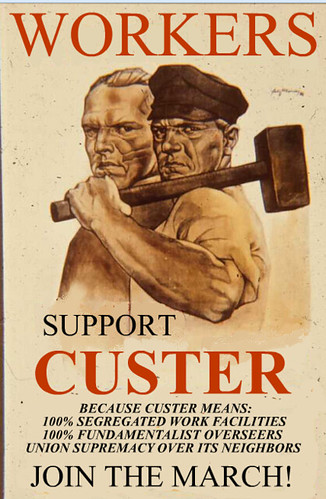
Last edited:
Just avoid having Africa's partition being too complete. It will take decades for people to get to some parts of the interior.
I know what you mean. They started colonization of Africa in the 1830s-40s, so it'll be earlier than OTL, though. 1900 is when they'll be pretty much colonized completely, but places like the Sahara are claimed by France and largely ignored. Prussia will be the powerhouse in the southern half of the continent. I also plan on making South Africa independent.
Thanks!
Even though I agree with you, Custer will not be fighting Jackson. If you had posted it a few chapters ago, I might have done it though.
I will give a hint here at the next chapters: a major conflict in Asia is coming in 1901 with the colonial powers in competition to grab as much land as possible. You will see the Republican Union Bluecoats invading Korea and taking Pacific Islands, among many other things. It'll be the first test of Custer's army (he'll become leader in the next chapter). Also, Africa is about to be divided up, Arabia shall be unified, and there will be more territorial exchanges than you can shake a stick at.I already have the map ready even!
Erm, how do you figure they can do that? Last I checked, the RUA didn't have any Pacific ports to launch an invasion from, and I doubt they have the resources or fleet strength to invade those places from what few ports they have on the East Coast. Granted, their industrial level is pretty high, but how strong is their navy really?
Erm, how do you figure they can do that? Last I checked, the RUA didn't have any Pacific ports to launch an invasion from, and I doubt they have the resources or fleet strength to invade those places from what few ports they have on the East Coast. Granted, their industrial level is pretty high, but how strong is their navy really?
I should have clarified: invading with other countries in a Boxer Rebellion situation.
I should have clarified: invading with other countries in a Boxer Rebellion situation.But they will be trying to get ports with easier access to the Pacific. I haven't figured it all out yet, but that's my general idea.
Their navy will be modernizing like all others, I do know that.
Considering how North America was filled with an unrealistic amount of blue I would suggest taking the Organ country and a swather of land and make some repulic of Missouri or something that would unify with the Republican Union.
Considering how North America was filled with an unrealistic amount of blue I would suggest taking the Organ country and a swather of land and make some repulic of Missouri or something that would unify with the Republican Union.
Remember, one of the latest chapters was about "the FIRST Louisiana Revolt."
In which case you could use as their personification the Madonna with her halo of twelve stars.Remember, one of the latest chapters was about "the FIRST Louisiana Revolt."
Thanks for answering my questions, I also hope my comments were at least half-correct.
Quick question, what's the name of that Spanish-speaking country on the top of South America? Is it called New Granada, Gran Colombia, etc.? I certainly hope it's not just "Colombia", that'd just be confusing given the Southron adoption of that term.
Also, get cracking on that next update!
Quick question, what's the name of that Spanish-speaking country on the top of South America? Is it called New Granada, Gran Colombia, etc.? I certainly hope it's not just "Colombia", that'd just be confusing given the Southron adoption of that term.
Also, get cracking on that next update!
Thanks for answering my questions, I also hope my comments were at least half-correct.
Quick question, what's the name of that Spanish-speaking country on the top of South America? Is it called New Granada, Gran Colombia, etc.? I certainly hope it's not just "Colombia", that'd just be confusing given the Southron adoption of that term.
Also, get cracking on that next update!
'Welcome!
Gran Colombia. I've only mentioned it a few times, but it's a second-rate country that doesn't have too much power. It's just below Great Power level. It might become a GP in the future.
Already writing!
Really nicely done flags! Virginia's flag looks like Texas and I would have said SC's flag was of an Islamic country.
Thanks! I based Virginia's on OTL's CSA national flag. And you're right, what is it with the Carolinas and that Crescent moon? They use that in real life, and I've always been puzzled.
The moment we've all been waiting for. Custer and the Manifest Destiny Party come to power. 
THE MARCH ON PHILADELPHIA

George Armstrong Custer's life was about to come full-circle. Thanks to his company, he was a multimillionaire and was one of the most respected men in the country. Finally, in 1884, he made his intentions known to the world: he was going to run for First Chief Consul in the near future. But this wasn't the typical consulate run that happened dozens of times in the past. No, Custer announced he wanted to do away with the one year terms if he won, and would also draft a new constitution. He claimed it wasn't any expansion of power, but the "next great step for our country to achieve our Manifest Destiny." Instead of one year, the Chief Consuls would rule for six year terms, and could run again however many times they wished. On July 4th, 1885, Custer formed the Manifest Destiny Party.
The Manifest Destiny Party consisted of the most radical, die-hard "patriots" that Custer could find. All members wore little pins or ribbons identifying themselves as such, and branches popped up in all the major cities. The government, while still claiming Custer was a hero, began to secretly plot against him. Aaron Burr III, grandson of AFC church founder Aaron Burr II, desired to become First Chief Consul also, and he was determined to stop Custer at all costs. Burrites fought in the streets against Manifest Destiny Party gangs in huge small arms and hand-to-hand combat battles, while both candidates acted like friends in public. Secretly, they hated each other, and Burr knew Custer was faking his faith in the American Fundamentalist Christian Church. In 1889, Custer began his campaign.
The Manifest Destiny Party campaign was coined "The March on Philadelphia" by Iowai Consul William Jennings Bryan, who was also candidate for Second Chief Consul. Bryan spoke at the Coliseum, the Party's headquarters in Shicagwa, and helped rally widespread public support for Custer in his "Triumph of the Party" speech (March 5th, 1890):
The Manifest Destiny Party consisted of the most radical, die-hard "patriots" that Custer could find. All members wore little pins or ribbons identifying themselves as such, and branches popped up in all the major cities. The government, while still claiming Custer was a hero, began to secretly plot against him. Aaron Burr III, grandson of AFC church founder Aaron Burr II, desired to become First Chief Consul also, and he was determined to stop Custer at all costs. Burrites fought in the streets against Manifest Destiny Party gangs in huge small arms and hand-to-hand combat battles, while both candidates acted like friends in public. Secretly, they hated each other, and Burr knew Custer was faking his faith in the American Fundamentalist Christian Church. In 1889, Custer began his campaign.
The Manifest Destiny Party campaign was coined "The March on Philadelphia" by Iowai Consul William Jennings Bryan, who was also candidate for Second Chief Consul. Bryan spoke at the Coliseum, the Party's headquarters in Shicagwa, and helped rally widespread public support for Custer in his "Triumph of the Party" speech (March 5th, 1890):
"The Manifest Destiny Party is going to win the greatest success in its history in just a few months. Standing upon this victory-crowned summit, will it turn its face to the rising or the setting sun? I say, ladies and gentlemen, that General Custer shall lead us to a thousand-year Republic upon which the sun will never set!"
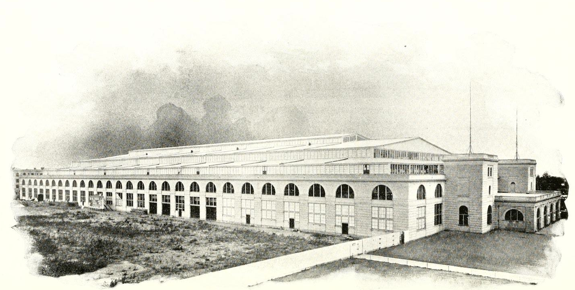
The Coliseum
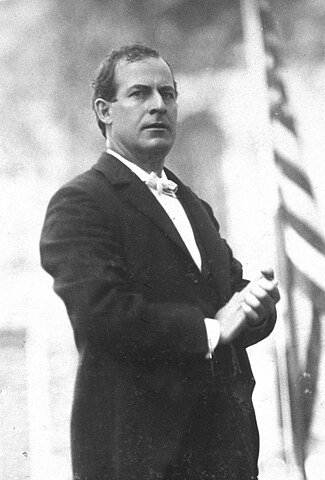
William Jennings Bryan flanked by a Manifest Destiny Party flag

The Coliseum

William Jennings Bryan flanked by a Manifest Destiny Party flag
That day, the MDP unveiled their new flag. It was almost exactly like the flag of the Old Republic, but it included stars for every region and state the radicals believed were "rightful Union land." The number of stars varied greatly, and some were downright ridiculous, with the version with the most sporting 50 stars. Maps were another common MDP propaganda tool, showing North America "the way it should have been and will be."
Finally, the election began on December 10th, 1890. The winner would not be announced until the day before Christmas Eve (Remembrance Day). Commander A. A. Lincoln, Chief of the Military Police, was to announce the winner at Independence Hall. When that day came, Burr III and Custer were present to hear the results, with thousands of followers.
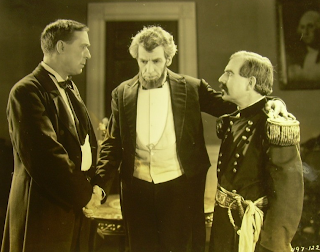
Lincoln announced that Aaron Burr III had won by a mere 1% of the vote. Enraged, Custer stormed out, insisting that he was the rightful winner. Riots broke out all across the country and the government was on the verge of collapse as Custer proclaimed himself "Anticonsul." The eccentric general began a literal "March on Philadelphia," and he made it known he was going to overthrow Burr. On New Year's Day, 1891, Custer's "blueshirts" and some employees of his mercenary company arrived outside the capitol building, facing off against Burr's loyalist soldiers. Following a 30-minute gun battle, Custer personally led his men in a storming of the domed palace and seized Aaron Burr III and Second Chief Consul Andrew Wilkes. He was removed from power and thrown in prison on a dozen charges. He was convicted of election fraud, bribery, blackmail, and extortion. Oddly, these charges were true for once, and Burr was extremely corrupt. Custer actually had won the election, by 68%.

Blueshirt troops face off against Burrite rioters outside of Philadelphia
Immediately upon Custer taking power, several prominent government officials turned up dead. The most important was Commander Lincoln, who was found outside of his house with a gunshot wound to the back of his head. The MDP denied any involvement and said that Lincoln was a great man. Anarchists, the old reliable scapegoat, were blamed instead. Local tavern owner and businessman Hiram Grant, Burr's most ardent supporter in Shicagwa, was found in his residence hanging in his attack in "an apparent suicide."
Custer proclaimed himself First Chief Consul on January 15th, 1891. William Jennings Bryan entered the office of Second Chief Consul the following week after the capital was secured by the R.U. Army and the Burrites had been locked up.
The new constitution was adopted just two months later, with all the changes Custer had promised. One section that was a surprise, however, was the fact that he had integrated his Custer's Company army into the government as the "Office of Racial and Religious Affairs," abbreviated ORRA. He also had the government pass bills purchasing airships from the Goodyear Air & Rail Company. These ships would be flown exclusively by the Office of Racial and Religious Affairs to patrol the Canadian, Louisianan, and Southron borders.
Thousands and thousands of men would now be a part of ORRA in effort to stamp out "religious heresy, blasphemy, and dangerous cults," as well as doing what Custer's Company had done for years: track down and move Inferiors into ghettos and the "stubborn" Inferiors into the Ohio region's reeducation camps. Beginning in 1892, ORRA's "aerforce" started paroling the Canadian border. "Runners" (those who tried to escape to French Canada) found themselves under attack from the sky. Snipers would stand on platform on the sides of the vessels and fire at the "traitors" down below. Escapes by Inferiors into Canada fell 90% in the time between 1891 and 1893. ORRA was just beginning its campaign of terror, and it would go well into the next century.
Finally, the election began on December 10th, 1890. The winner would not be announced until the day before Christmas Eve (Remembrance Day). Commander A. A. Lincoln, Chief of the Military Police, was to announce the winner at Independence Hall. When that day came, Burr III and Custer were present to hear the results, with thousands of followers.


Blueshirt troops face off against Burrite rioters outside of Philadelphia
Custer proclaimed himself First Chief Consul on January 15th, 1891. William Jennings Bryan entered the office of Second Chief Consul the following week after the capital was secured by the R.U. Army and the Burrites had been locked up.
The new constitution was adopted just two months later, with all the changes Custer had promised. One section that was a surprise, however, was the fact that he had integrated his Custer's Company army into the government as the "Office of Racial and Religious Affairs," abbreviated ORRA. He also had the government pass bills purchasing airships from the Goodyear Air & Rail Company. These ships would be flown exclusively by the Office of Racial and Religious Affairs to patrol the Canadian, Louisianan, and Southron borders.
Thousands and thousands of men would now be a part of ORRA in effort to stamp out "religious heresy, blasphemy, and dangerous cults," as well as doing what Custer's Company had done for years: track down and move Inferiors into ghettos and the "stubborn" Inferiors into the Ohio region's reeducation camps. Beginning in 1892, ORRA's "aerforce" started paroling the Canadian border. "Runners" (those who tried to escape to French Canada) found themselves under attack from the sky. Snipers would stand on platform on the sides of the vessels and fire at the "traitors" down below. Escapes by Inferiors into Canada fell 90% in the time between 1891 and 1893. ORRA was just beginning its campaign of terror, and it would go well into the next century.
Last edited:
Sorry I haven't gotten around to commenting lately, but I'm loving the new updates. 
Some quick things. I really liked the Burr back-story and how it gave some insight into the past of this world, plus the Custer bio as well.
I love how you've had the Prussians and Bonaparte's almost singlehandedly change the map of Europe so rapidly.

I love how this story/timeline is coming along. It seems as if the Gilded Age is a more dystopian Victorian Era. Is this right? Anyway, how long will Goodyear live? I remember you made an 1895 poster for the Goodyear blimps. Will he really live to be 95?
Love the updates on the Southern nations, and I love how you switched the roles of north and south. Very clever.
Some quick things. I really liked the Burr back-story and how it gave some insight into the past of this world, plus the Custer bio as well.
I love how you've had the Prussians and Bonaparte's almost singlehandedly change the map of Europe so rapidly.
I love how this story/timeline is coming along. It seems as if the Gilded Age is a more dystopian Victorian Era. Is this right? Anyway, how long will Goodyear live? I remember you made an 1895 poster for the Goodyear blimps. Will he really live to be 95?
Love the updates on the Southern nations, and I love how you switched the roles of north and south. Very clever.
Share: